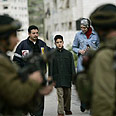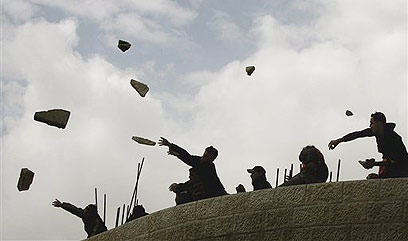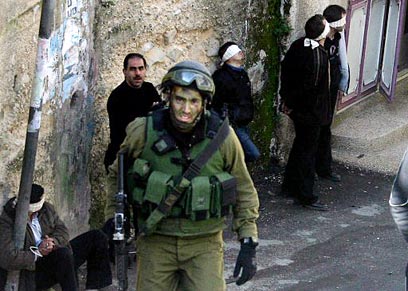
Not all operations will be so cautious, IDF officers say
IDF operation in Nablus this week deemed an operational success, as only several civilians were hurt and diplomatic process was not harmed. However, defense establishment officials stress that next time picture could be different due to terrorists' high motivation
Although the military operation was widespread compared to previous campaigns in the past year, a senior officer admitted that it was quite limited.
"We were asked by all ranks to do everything in order not to hurt innocent Palestinians, because it is clear that such an incident would be extremely significant, beyond the level of the division and brigade here."
According to the IDF, nine wanted Palestinian suspects were arrested during the operation, 11 suspects are still wanted for questioning, and weapons aches and several explosives labs were exposed.
Fighters who took part in the operation said that "it was pretty boring, we barely felt any action," thus exposing the IDF's sensitive condition. One the one hand, the army is committed to combat terror, but on the other hand, it must be cautious so that an operation malfunction does not harm the diplomatic process.
One Palestinian was killed during the operation, an IDF soldier was moderately injured, and three troops sustained light wounds.
The Palestinians, however, present a different picture. Nasser Abu Aziz, a senior member of the al-Aqsa Martyrs' Brigades, told Ynet that the IDF operation was a complete failure.
"None of the al-Aqsa members or members of other organizations were hurt or arrested," he said, adding that the reports on explosives labs being uncovered were "aimed at the Israeli public opinion in order to cover up the complete failure of the operation."

Stones hurled in Nablus (Photo: AP)
The Samaria division claims the operation was a success, although not all of the suspects were arrested, and more specifically, not all of the senior suspects were arrested.
However, the operation succeeded in harming as few civilians as possible and avoided a diplomatic mess at the same time.
The IDF announced, through local media channels, its search for terror sources, and expressed its intention to disturb the daily routine as little as possible.
Military sources admitted that the stalemate and the sensitivity in the diplomatic process could make the army's future operations difficult.
"It is obvious that every operation entails caution in terms of civilians, but at the end of the day terror is not activated in a sterile way. It is enough to see the rise in the number of potential suicide bombers arrested last year (279 compared to 154 in 2005), in order to understand how high the motivation is. We will not always be able to be so cautious," a military source said.
Gaza almost mini-Lebanon
Just before Defense Minister Amir Peretz concluded his visit to the southern command unit with IDF Chief of Staff Major General Gaby Ashkenazy on Tuesday, it seemed he was speaking of Hamas’ strengthening in a different tone than usual.
The moderate defense minister suddenly sounded as though he were prepared for a wide scale operation targeted at ending the incessant flow of artillery to the terrorist organization.
Data presented by senior officials during Peretz’s visit showed that with the amount of weapons Hamas was receiving, it had the potential to turn the Gaza Strip into a mini-Lebanon.
Security forces in the area have already been instructed on how to deal with existing threats.
Restrictions imposed on the security forces in Gaza due to the sensitive diplomatic situation, were more lenient in the West Bank. A military source did not agree that “his hands were tied” when it came to military operations in the West Bank.
“We had the freedom to operate, but carefully,” he said.

Military operation in Nablus (Photo: AFP)
It was the fighters, who came from Jenin and the northern border, who truly felt the restrictions.
One fighter who participated in the operation said, “There was preparedness, but something was missing. We were always careful not to make mistakes. They told us not to let a bullet escape in the wrong direction.”
Relative calm
Senior commanders in the West Bank admitted that the Nablus they saw this week was the calmest they had seen it in two years. Other elite unit fighters also described operations as “boring”.
“There were a few tense moments, but we’ve been involved in arrests that were bigger than this operation,” one fighter said.
The operation in Nablus came in response to a rise of terror infrastructures in the city. Security forces arrested over 800 suspects in Nablus last year, of which 117 were potential suicide bombers. Nine of the 11 explosive belts confiscated the West Bank over the past six months, were from the city.
Ali Waked contributed to the report










